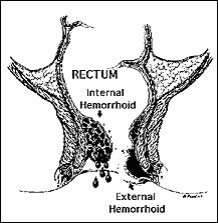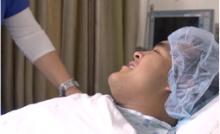Not everyone realizes that there are two types of hemorrhoids (commonly misspelled as hemroids, hemmroids, hemeroids), each requiring different treatment. The two types of hemorrhoids are internal hemorrhoids, located inside the rectum, and external hemorrhoids, forming under the skin surrounding the anus.
The board-certified colorectal surgeons at La Peer Health Systems’ Hemorrhoid Center of Excellence are experienced at treating both types of hemorrhoids. If you think you may be suffering from some type of hemorrhoid, feel free to make an appointment by calling (888) 742-2032.
Internal Hemorrhoids: Symptoms
 Because internal hemorrhoids form inside the lining of the rectum, people with this condition may not know they have hemorrhoids right away. Although this type of hemorrhoid is often painless, sufferers may notice blood in their bowel movements or on the toilet tissue. People with internal hemorrhoids may also experience an itching or throbbing sensation around the anus.
Because internal hemorrhoids form inside the lining of the rectum, people with this condition may not know they have hemorrhoids right away. Although this type of hemorrhoid is often painless, sufferers may notice blood in their bowel movements or on the toilet tissue. People with internal hemorrhoids may also experience an itching or throbbing sensation around the anus.
In certain cases, an internal hemorrhoid can become prolapsed, meaning that it protrudes from the anus. When left untreated, this condition can be incredibly painful. If you’re experiencing prolapsed hemorrhoids, don’t hesitate to seek treatment. Internal hemorrhoids may be difficult to treat with traditional creams. Hemorrhoid band ligation is one of the most common methods for treating this form of hemorrhoids.
Request your consultation today.
Call us at 888.742.2032 to schedule an appointment or:
External Hemorrhoids: Symptoms
External hemorrhoids form when the veins swell, filling the soft tissue with blood and causing bumps to occur on the skin. Because external hemorrhoids are visible to the naked eye, they are typically easier to diagnose. People with external hemorrhoids may notice bright red blood on their toilet tissue. The area around the hemorrhoids may also feel itchy or raw.
In many cases, it is possible to treat external hemorrhoids with creams and other home remedies. However, if you are experiencing persistent external hemorrhoids that are not going away, it is best to consult with an expert colorectal surgeon or GI doctor like the ones at the Hemorrhoid Center of Excellence.
Frequently Asked Questions
Q: How are external hemorrhoids diagnosed?
A: External hemorrhoids can usually be diagnosed through a simple visual and rectal examination.
Q: How are internal hemorrhoids diagnosed?
A: To diagnose internal hemorrhoids, our surgeons may need to insert a slender tube called an anoscope into the rectum. The tool has a light at the end, allowing doctors to see inside the rectum.
Q: Are ointments and creams effective at treating hemorrhoids?
A: Over-the-counter creams can, in some cases, be effective treating minor cases of external hemorrhoids. However, more severe hemorrhoids, and those occurring inside the rectum, may require medical treatment. If your hemorrhoids aren’t improving, consider seeing a specialist.
Q: What are some methods for treating internal hemorrhoids?
A: Some treatments for internal hemorrhoids include rubber band ligation, injection schlerotherapy, and hemorrhoidectomy. A colorectal or GI specialist will help you determine the most effective treatment.
Q: Will I need a colonoscopy to diagnose internal hemorrhoids?
A: No, but our Los Angeles surgeons could perform a colonoscopy to rule out any more serious conditions.
Q: What surgical treatment options are there for hemorrhoids?
A:
Contact Us to Schedule an Appointment
If you think you may be suffering from internal or external hemorrhoids, feel free to contact the board-certified colorectal and gastrointestinal doctors at the Hemorrhoid Center of Excellence for a consultation. We can be reached at (888) 742-2032 or by filling out the contact form on this website.
Next, learn about internal hemorrhoids.










